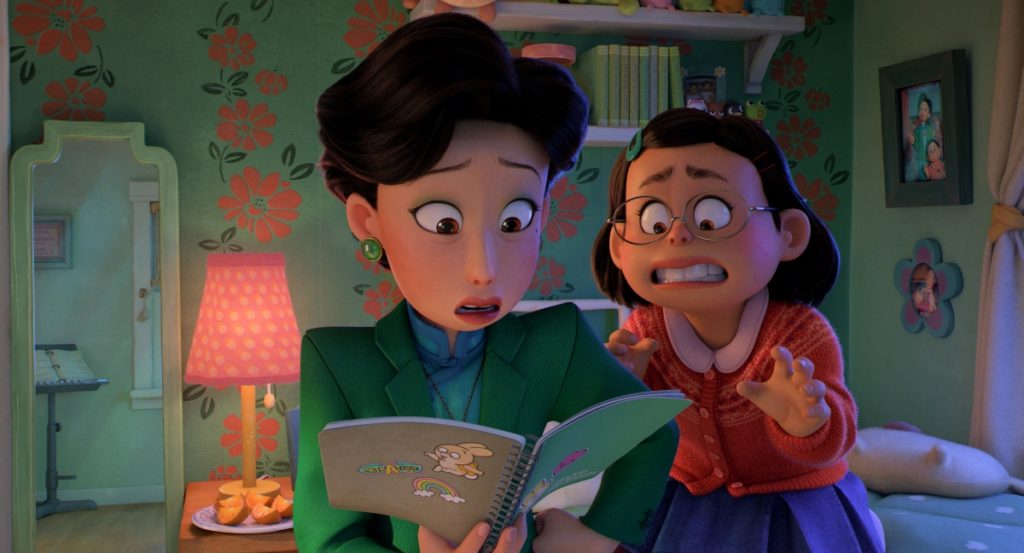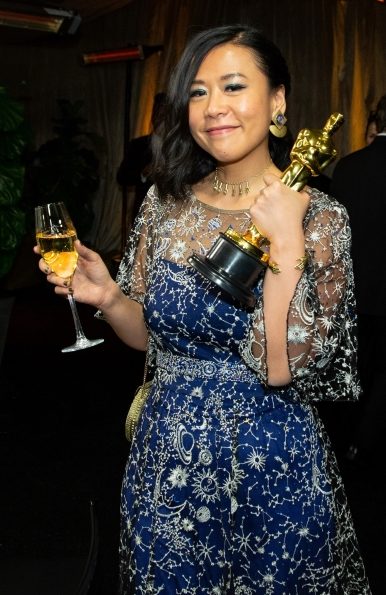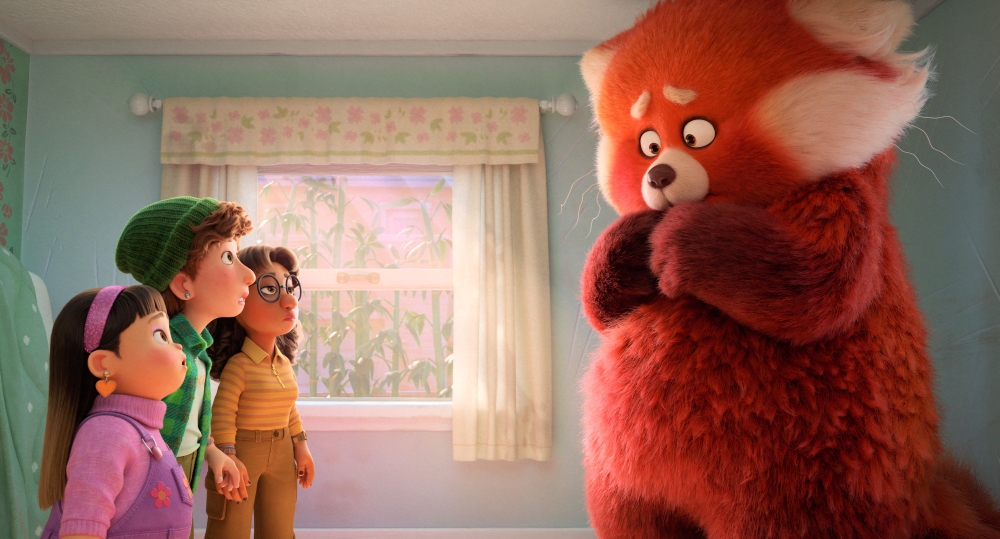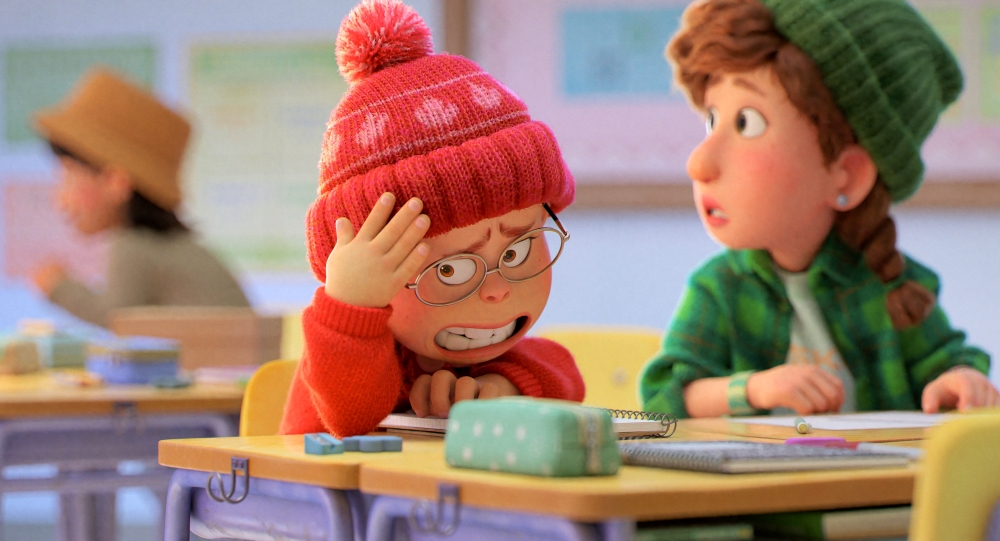Reviews include Wicked: For Good, Rental Family, and Champagne Problems.
“Who knew pads would be such a big deal?” Domee Shi on *that* Turning Red Review
March 31, 2022

By Rachel Ho
Leading up to Turning Red’s release, excitement for the film was high, especially in Canada. The first feature from Academy Award winner Domee Shi (Bao) was set to show off Toronto in a way rarely seen and bring all the early-aughts nostalgia the filmmaker experienced growing up in the city. The movie about a pre-teen Asian-Canadian girl who poofs into an adorable, fluffy red panda when she gets overly-excited promised to flip the script on conventional coming of age tales Prime Minister Justin Trudeau even sent a surprise video message of congratulations to the cast and crew during the Canadian Premiere in Toronto.

When reviews for Turning Red started to trickle in, the vast majority were dripping with praise (the film holds a 94% ‘Certified Fresh’ critic rating on Rotten Tomatoes as of publication), but one review stood out as particularly negative. In the now-deleted 1.5 star review on Cinema Blend, Managing Editor Sean O’Connell dismissed the film as too specific in nature: “By rooting Turning Red very specifically in the Asian community of Toronto, the film legitimately feels like it was made for [director] Domee Shi’s friends and immediate family members. Which is fine…but also, a tad limiting in its scope.”
I spoke with Shi over Zoom about the misguided reaction to her film, and she expressed her surprise with the response, especially given her crew’s enthusiasm while making it. “The movie was led by an amazing team of women, but it was [also] made by a lot of dudes,” laughs Shi. “Dudes that were very, very excited to be working on this movie. A lot of the funniest, weirdest, girliest scenes in the movie were animated by white dudes.”
Surprising or not, O’Connell’s derisive argument that Turning Red failed to deliver because it wasn’t made for him, perfectly exemplified the narrow perspective some film critics hold. Even after these last few years in particular where concepts like representation and inclusion have been beaten over everyone’s head, it’s clear that for some, the messaging isn’t truly being absorbed until they’re forced to confront it.
O’Connell’s review was met with overwhelming disdain online and prompted an apology from Cinema Blend and the site’s Editor-in-Chief, Mack Rawden. O’Connell himself apologized on Twitter and again on his podcast, Reel Blend. By his own admission, O’Connell is aware of his blind spots and will hopefully take steps going forward to broaden his mindset.
Shi was aware of the online discourse and found it amusing. “We released our cute dorky movie [and it] got so much conversation and controversy, and was in the middle of a Twitter war!” says Shi. “But it was kind of cool at the same time, too. Who knew that pads would be such a big deal?”
O’Connell wasn’t alone in his belief that the film fell too far on the side of specific. Rotten Tomatoes audience reviews include rather patronizing comments like, “Wasn’t made for my demographic…I’m not Chinese and I don’t live in Toronto, and I’m not female. I’m sure people in any of those groups might like it, and good for them.”
One IMDb reviewer appeared confused by the concept of an Asian-Canadian: “it tries to be canadian but there is no alignment or resemblance of canadian culture. Its very confusing because its based in toronto but seems its based on chinese culture? Its just weird and confusing and it simply makes no sense. Has a girls only vibe rather than unity and clearly makes an effort for a girls only audience.” [sic]

To Pixar’s credit, according to Shi, they never once questioned whether her vision for the film was “too Toronto,” “too Canadian,” or “too female”. In 2017, Shi pitched the studio three ideas, thinking she would need ‘normal’ alternatives to her story of a “Chinese-Canadian girl dealing with magical puberty,” but didn’t require them.
“I felt the support from Pixar from the very beginning,” Shi says. “I think what drew Pixar to [the film] was in that specificity, they saw the universality of an experience that we’ve all gone through: big changes in our bodies and our relationship with our moms. We never felt like we were ever being too Asian or too female. And it was just awesome to have this movie be embraced by so many people at the studio.”
While Turning Red isn’t perfect, much of the criticism levied against the film was steeped in exhausting racist and sexist undertones. It’s exhausting to read that a film causes such discomfort and anger when it dares to change the formula and show a messy, emotional young woman, instead of falling in line with the countless coming-of-age tales told from the perspectives of straight, white male protagonists.

The mere existence of Turning Red shows that progress has been made in Hollywood: an Asian-Canadian writer and director receiving the opportunity to share her story drawn from her experience would have been an anomaly 20 years ago. But the vitriol with which one too many reacted to the film in 2022 shows how much further we need to go.
Shi is part of an exciting group of filmmakers in the Asian diaspora working today. And although she wants creatives of all backgrounds to be able to tell their own stories, she wishes diversity in film would be a normal occurrence, rather than a viral moment.
“My hope is to keep going to a point where it doesn’t have to be headline news that an all-Asian cast is in the next big budget Marvel movie or whatever. That it just becomes so normal that we get to a point where we can go easier on ourselves and have mediocre stories [and] prestigious movies,” Shi muses. “That it just becomes normal to go to the theatres and watch a movie with the entire cast being Asian or otherwise. I think that’s my dream for the future.”
Turning Red is now streaming on Disney+.
Rachel Ho is the winner of the 2021 TFCA Emerging Critics Award. She has written for Exclaim!, POV Magazine, and That Shelf, and is the co-host of the Contra Zoom Pod podcast. She has a particular interest in Canadian and Hong Kong films with a soft spot for the movies of the ’90s. You can read her film reviews and interviews on rachelkh.com, and follow her on Twitter @_rachelkh.



